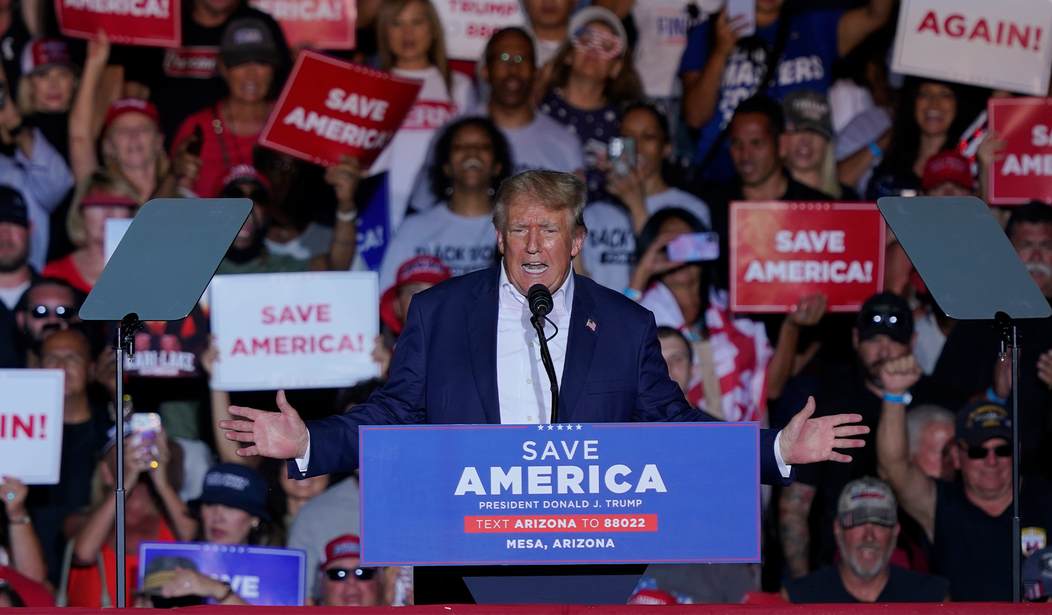The blame game continues. In the quest for understanding why the Republican red wave shrunk to more of a crimson drip, conservatives are trying to figure out who is responsible for the outcome. Amid an abundance of finger-pointing, some have suggested that former President Donald Trump is the primary culprit.
But is this true?
Several GOP lawmakers and influencers have intimated that Trump made a series of errors that contributed to the disappointing showing on the part of Republican candidates. The Washington Examiner reported:
Coupled with Trump’s tantrum over Gov. Ron DeSantis’s (R-FL) wipeout reelection and a bizarre swing at Gov. Glenn Youngkin (R-VA), Republicans have started shying away from supporting Trump in another presidential bid. Republicans are projected to take a narrow majority in the House, while the Senate majority is yet to be determined by the outcomes of key races in Nevada, Georgia, and Arizona.
“Even before this election, I heard from 99% of donors, supporters, and activists that they ‘loved Trump,’ but it was time for him to move on,” a GOP lawmaker told the outlet.
“He picked bad candidates and Biden has bad favorabilities, all the issues aligned with — we were at 2% [RealClearPolitics] average, which should have been a 5 or 6,” another GOP lawmaker said. “And I am convinced that he’s the major reason why — swing voters don’t like him.”
Another Republican lawmaker said the GOP “is going to come to the reckoning that Trump is not going to lead us to the promised land,” and that members of Congress who are part of the Freedom Caucus “are largely utilitarian” and that they would drop Trump “like a hot potato” if they believe Trump will be more of a hindrance than a boon.
Rep. Tim Walberg (R-MI), who was endorsed by the former president, indicated that he might “need to change his message.”
“I don’t like that either,” Walberg said. “That that turned out that way, and it was somewhat unexpected. So I hope that President Trump, as he moves forward, really does a postmortem and thinks what this means to his message.”
Sen. Kevin Cramer (R-ND) said during an interview with a local radio show that the former president failed to demonstrate that he could unify the nation.
“Donald Trump’s statements about Ron DeSantis, I think, demonstrated a significant flaw, frankly, in his ability to unify the party and unify the country,” he said. “And so, as much as I’d love four years of Donald Trump, followed by eight years of Ron DeSantis, it’s those first four years that I would worry about us being able to achieve. We need to put our absolute best foot forward.”
On the other hand, some Republicans disagreed. Republican Conference Chairwoman Elise Stefanik (R-NY) defended Trump and said she would support him if he chooses to seek the presidency again in 2024.
“Republican voters determine who is the leader of the Republican Party and it’s very clear President Trump is the leader of the Republican party. What the media fails to report is that we just won the midterms and flipped the House,” Stefanik said in a written statement.
Many of the candidates Trump endorsed in critical races did not perform as well as desired:
Trump’s Senate and gubernatorial candidates underperformed on Tuesday night, with both Senate candidate Dr. Mehmet Oz and gubernatorial candidate Doug Mastriano losing in Pennsylvania, Herschel Walker’s (R) Georgia election heading to a runoff, Don Bolduc falling far behind in his New Hampshire Senate bid, and Blake Masters (R) trailing Sen. Mark Kelly (D) in Arizona as of Friday.
As RedState reported late Friday, Masters has since lost the Senate seat to Kelly.
So, is Trump to blame for the GOP’s less-than-stellar performance? I would suggest the answer is far more nuanced than simply asserting that the former president deserves to be the scapegoat.
For starters, it is worth noting that Trump did make some questionable choices when it comes to some of the candidates he endorsed. Dr. Oz in Pennsylvania was such a bad choice that even the base balked when the former president gave him the nod. He was such a horrible candidate that he couldn’t even defeat John Fetterman, despite the fact that Fetterman’s cognitive issues make President Joe Biden look like a smooth talker.
Then, there is former NFL legend Herschel Walker, who couldn’t perform well enough against Sen. Raphael Warnock (D-GA) to avoid a runoff election. At this point, it is not clear whether he can garner enough support to eke out a victory. This means the GOP’s chances of taking the Senate is rather precarious at the moment.
Nevertheless, the idea that Trump is to blame for the outcome doesn’t hold water. As I wrote previously, the GOP failed to implement an effective messaging strategy to use against the Democrats. They were wise to attack Biden and other Democratic politicians on issues like inflation, crime, immigration, and other areas in which the left has failed to provide viable solutions.
However, they failed to provide voters with alternative solutions to the problems everyday Americans are facing. They did not articulate what they would bring to the table to ease the economic burdens people are experiencing. The “we’re not Democrats” strategy was never going to move enough people to bring about the red wave Republicans sought.
There are plenty of lessons to learn from the 2022 midterm elections. But playing the blame game will only ensure that the GOP repeats the same mistakes in the future.













